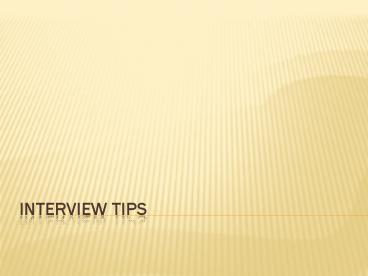Interview Tips - PowerPoint PPT Presentation
1 / 16
Title:
Interview Tips
Description:
Don't try to take over the interview. ... Almost all interviewers will ask if you have any questions. ... Save those what's-in-it-for-me questions for later. ... – PowerPoint PPT presentation
Number of Views:64
Avg rating:3.0/5.0
Title: Interview Tips
1
Interview Tips
2
Arrive a little early
- If you arrive about fifteen minutes before the
scheduled interview time, you will have time to
collect your thoughts, wipe the perspiration from
your hands, and scan the lobby for current
company information. - You will also show your interviewer that you
value his or her time.
3
Do your homework
- Know the interviewer's name and how to pronounce
it (including proper title Mr., Mrs., Dr.,
etc.). - Know the company's major products or services,
the organization of the company (divisions,
parent company, etc.), current business news
about the company and the company's major
customers and competitors. - You can learn most or all of this information
from the company's website, annual report or
company literature.
4
Bring a Spare Copy of Your Resume in a Briefcase
or Folder
- This demonstrates that you are prepared.
- It also gives the interviewer something to take
notes on.
5
Expect to Spend Some Time Developing Rapport
- Personal chemistry is a main ingredient in the
hiring process. - Try to relax and become comfortable with the
interviewer.
6
Watch Your Non-Verbal Communication
- Maintain an open body posture and appropriate eye
contact. - Seat yourself at a reasonable distance from the
other person. - Smile.
7
Don't Be Embarrassed by Nervousness
- Interviewers are human, and they often become
nervous, too. - In fact, nervousness is a good sign - it shows
that you are taking the interview seriously. - Avoid nervous mannerisms such as tapping your
fingers, feet, playing with pens, etc.
8
Body language is powerful!
- Good eye contact, a warm, natural smile and a
firm handshake can help you overcome nervousness,
develop a personal rapport and present a
confident image.
9
Don't Play Comedian or Try to Entertain the
Interviewer
- It is important to be personable, but do not
overdo it.
10
Don't Exaggerate or Lie
- You might be tempted to embellish your
achievements in the interview, but it will come
back to haunt you on the job!
11
Follow the Interviewer's Lead
- Don't try to take over the interview.
- Stick to the main subject at hand, but do not
dwell too long on one point. - It is better to deal with many questions rather
than just one or two in-depth questions, unless
that's where the interviewer leads you.
12
Be Prepared For Personal Questions, Even Some
Inappropriate Ones
- Anticipate how you will handle personal questions
without blowing your cool. - Some interviewers may not be aware of what they
can and cannot legally ask you. - Be sure you understand the question.
- It is okay to ask for clarification.
13
Don't be Afraid to Think Before You Speak
- Use silence and intentional pause to your
advantage. - Time is occasionally needed to think and to
reflect. - The interviewer will respect you for taking a
question seriously enough to give it a moment or
two of consideration before answering.
14
Watch Your Grammar and Your Manners
- Employers are interested in candidates who can
express themselves properly. - Even if you have to slow down to correct yourself
-- do it! - Use slang expressions very sparingly.
- If your knowledge of rules of etiquette are
rusty, take a "refresher course" from a
knowledgeable friend.
15
Be Prepared to Ask Questions
- Almost all interviewers will ask if you have any
questions. - Your questions should be related to details about
the company and should be based on the
information you learned from the homework you
have done. - You should not ask questions like "How long to I
have to wait before I can take a vacation?" - Save those what's-in-it-for-me questions for
later.
16
Be Yourself!
- You do not want to get hired on the basis of
something you are not. You want to be hired for
who you are!
Information obtained from JobOpenings.net































